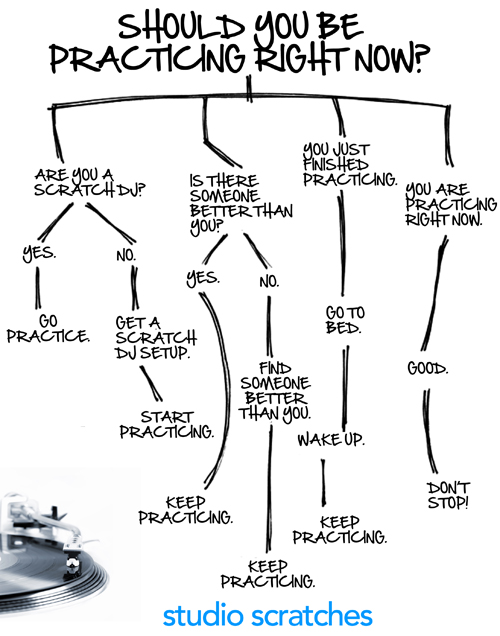I was thinking about my own development and evolution as a DJ, and also about the students I’ve worked with at the Scratch Academy. In my three semesters, I’ve seen students go from never touching turntables to mixing perfectly in front of classmates and at graduation. Sometimes it feels like the the longer you’ve been doing something, the harder it is to keep getting better, so I thought about how I’ve improved over the past year or so and what I need to do to keep pushing.
Try different genres
There’s so much great music out there, try something you haven’t played before – house, techno, hip hop, electro, indie, nu disco, dubstep, trap, glitch. In one sense, mixing is mixing, but there are nuances between the song structures of the genres that can really help expand how to think about DJing. Mastering other genres also gives you a lot more flexibility when playing out. Personally, I started mixing house music in 2000, and most of my mixes were long blends over a minute or more. Focusing on hip hop where tracks are shorter and mixes are quicker really taught me a lot. At this point I feel comfortable playing old school and new hip hop, 80s, top 40, rock, deep house, classic house, techno, progressive, nu disco, edm, downtempo electronic / lounge, dubstep, and glitch. I’ve played a bit of reggae and funk, but I want to get better at both, and classic disco is something I haven’t really touched that I’d like to pickup at some point.
Make mix tapes
Putting a mix tape together can really help find stuff that works together and define your sound. I try to find mixes that really stand out, either because they’re really clean, they create complimentary sounds, it’s a clever or unexpected combination, or all of the above. Recording mixes a few times (or more) makes me focus on it until it’s almost second nature, and it provides something to use in different situations playing out. When I do a mix, I want it to be good enough that I’ll listen to it for years to come, so it really pushes me to raise my game. I’ve done mixes of many different types the sound I’ve become known for is lounge-y hip hop mixed with chill electronic, I feel like while I can play lots of different music and cover most situations, that’s something that differentiates me as a DJ.
Expand your style
There are a lot of different elements to DJing and turntablism. If you primarily blend records together, try incorporating scratching or dropping in on beat without mixing. If you do a lot of drops, try working on longer blends and on the fly mash ups. I’ve really tried to incorporate scratching into my mixes over the past year, it’s taken longer than expected, but working on techniques and patterns has really helped my hand control and drops when I’m mixing. You can be a great DJ and not really mix or scratch, but doing it all creates a lot of flexibility and can take the audience to another level when used properly. Here’s a great example of using lots of different techniques in a mix: [bd_youtube id=SKPzxmLGk74 width=620 height=375 float=none]
Watch other DJs
I love going out and listening to other DJs, a great set can be inspiring – I wrote posts about a Sasha set and seeing my friend Chad Cisneros of Tritonal. I also try to get ideas for tracks I want to use and different transitions. Don’t try to use other DJs specific routines, but take what you hear from other DJs and make it your own.
Practice
This may seem obvious, but practice makes perfect (and permanent). Freestyle sessions are fun and chill, but when I practice, I try to focus on specific skills like scratching and juggling, building out tracks from a genre that I don’t play that often, or going through new music so I’m more comfortable incorporating into a live set or on a mix tape. I end up trying new things when I’m playing out, but a lot of it ends up being stuff I’ve practiced before as well. When you’re practicing, imagine you’re playing to a crowd, and record and listen to your sessions. There’s a concept called the Hawthorne Effect, the idea is that when someone knows they are being monitored, they perform better, which I’ve found to be very true. When I first started recording myself, I used a cd burner, and since I didn’t do it that often, I often felt like it made me a little tense – if you do feel this, it should go away the more times you do it. Listening to your sessions will make you feel better about the things you are doing well, and help focus on areas for improvement.

What are you waiting for? GO PRACTICE!!!
After all that, I better have the chops to back it up, right? Check out this recent mix I did and let me know what you think.
Thanks for reading, if you learned something, head over to my site and read more and let’s be friends on SoundCloud.
– DJ Analytic

